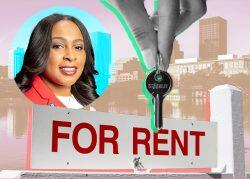Rent stabilization is moving up — upstate, that is.
Kingston will become the first city north of the northern suburbs to have the rent control policy in place, the Times Union reported. Rent stabilization is present in some Nassau, Westchester and Rockland county localities, and in more than 900,000 New York City apartments, but had not been expanded in ages until the Kingston Common Council passed a resolution last week declaring a housing emergency in the Ulster County city.
State law allows rent stabilization to be enacted for certain older buildings if a housing emergency is declared in a municipality; that requires a vacancy rate below 5 percent. A recent survey found the vacancy rate in Kingston to be 1.57 percent.
Mayor Steve Noble previously said he expected at least 1,200 units would be affected by rent stabilization. The mayor has said he would sign the resolution into law.
Read more


Under the Emergency Tenant Protection Act, rent increases can be dictated by the government for buildings constructed prior to 1974 and having more than six units. The housing emergency declaration sets the process in motion to establish a local rent control board.
Only one member of the Kingston council voted against the resolution. Michael Olivieri argued the resolution would harm good landlords by roping them in with bad ones. Olivieri planned to introduce an amendment to increase the number of units needed in a building for rent control to take effect.
Kingston has taken actions to protect tenants as the movement of city dwellers and other factors during the pandemic have pushed up housing prices in the Hudson Valley. Kingston adopted a good cause eviction law in January, although that is in jeopardy after a judge recently found Albany’s good cause statute violates state law. The measure grants tenants who are current on rent the right to a lease renewal and protects them from rent increases above a certain threshold.
Rent stabilization, however, restricts rent increases more severely. It can also allow tenants to pass leases to their heirs without landlords having a say in the matter.
Once units’ rents are kept artificially low, their vacancy rate also tends to stay low, allowing the locality to repeatedly extend the housing emergency. That has made rent stabilization a de facto permanent part of the rental market in New York City and other places that have adopted it.
Critics say rent control limits turnover, making it harder to find affordable rentals, and discourages and sometimes essentially prevents landlords from investing in their properties.
— Holden Walter-Warner
